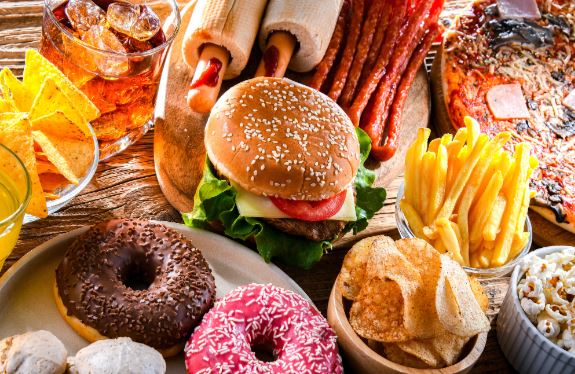
As the sun sets and the day transitions into night, our bodies naturally begin to wind down in preparation for rest.
During this time, it’s essential to be mindful of our food choices to support optimal digestion, sleep quality, and overall health.
Certain foods, when consumed after sunset, can disrupt our body’s natural rhythms and lead to digestive discomfort, energy fluctuations, and even sleep disturbances.
Here’s the list of foods you should avoid eating after sunset and the reasons behind these dietary recommendations.
Is there a correlation between sleep and cancer?
1. Processed foods
Foods high in refined carbohydrates, sugars, and unhealthy fats, such as fast food, sugary snacks, and processed desserts, should be avoided after sunset. These foods can spike blood sugar levels, leading to energy crashes and disrupting sleep patterns.
2. Spicy foods
Spicy foods, such as curry, chili peppers, and hot sauces, can irritate the digestive system and cause acid reflux or heartburn, especially when consumed close to bedtime. These foods may also increase body temperature, making it harder to fall asleep and stay asleep.
3. Caffeinated beverages
Coffee, tea, energy drinks, and other caffeinated beverages should be limited in the evening, as caffeine can interfere with the body’s natural sleep-wake cycle. Consuming caffeine late in the day can delay the onset of sleep and reduce overall sleep quality.
4. Heavy or fatty foods
Rich, heavy meals that are high in fat or protein, such as fried foods, creamy sauces, and fatty cuts of meat, can be difficult to digest, especially when eaten late at night. These foods can lead to bloating, indigestion, and discomfort, making it harder to relax and fall asleep.
5. Alcoholic beverages
While a glass of wine or a cocktail may seem relaxing, alcohol can disrupt sleep patterns and contribute to poor sleep quality. Alcohol interferes with REM (rapid eye movement) sleep, leading to fragmented sleep and waking up feeling unrested.
6. Highly acidic foods
Acidic foods, such as citrus fruits, tomatoes, and vinegar-based dressings, can cause acid reflux or heartburn, particularly when consumed close to bedtime. These foods may trigger digestive discomfort and disrupt sleep, especially for individuals prone to acid reflux.
7. Large meals
Eating large, heavy meals shortly before bedtime can overwhelm the digestive system and lead to discomfort, bloating, and reflux. It’s best to consume smaller, lighter meals in the evening to promote better digestion and facilitate restful sleep.
8. Excessive fluids
While staying hydrated is important, consuming large quantities of fluids, especially water, right before bed can disrupt sleep by causing frequent trips to the bathroom during the night. It’s advisable to hydrate adequately throughout the day and limit fluid intake in the hours leading up to bedtime.




